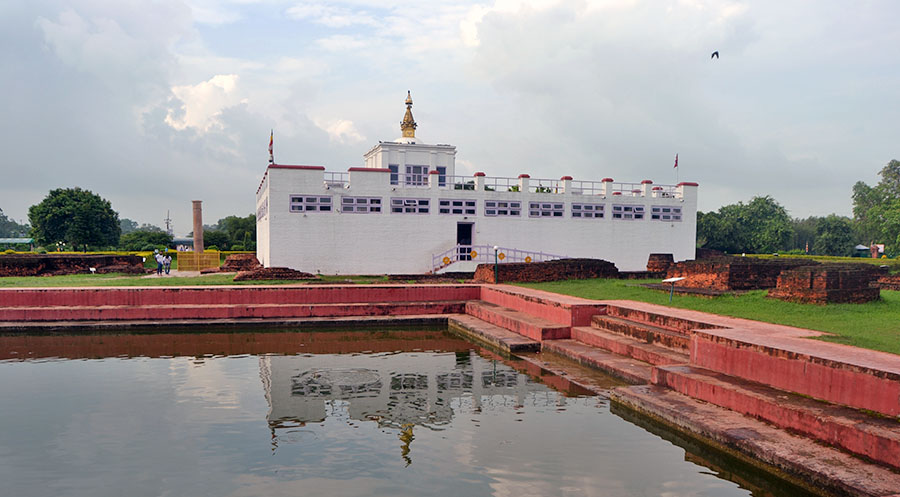Celebrating the major events of Buddha’s life
Buddha Jayanti/Buddha Purnima brings Buddhists from all over the globe together to commemorate the three major events in Buddha’s life: his birth, enlightenment, and nirvana. It raises awareness of Buddha’s teachings in a way that respects all cultures. Every year on the full moon day of the Hindu month of Vaisakha, Buddha Purnima is observed to commemorate the birth anniversary of Lord Buddha, the founder of Buddhism.
Places of religious significance
According to Buddhist traditions, Prince Siddhartha Gautama, later known as Gautama Buddha, was born in Nepal’s Terai area in 623 B.C. in Lumbini of Nepal. A parade performs in the morning in Lumbini, and a formal schedule of cultural activities is there during the day. The Mayadevi Temple is adorned at night. Based on the ancient writings, it was a full moon day. The date of Buddha Jayanti is based on the Asian lunisolar calendar, hence it varies from year to year. Including Nepal, the other countries such as India, Sri Lanka, Myanmar, Cambodia, Java, Indonesia, Tibet, and Mongolia mark the occasion. It is also known as Vesak or Vaisakhi Buddha Purnima.
The festival of Buddha Purnima is all about embracing Buddhism’s precepts of nonviolence, peace, and harmony. Buddhists wear white garments and meditate on this day. They exclusively eat vegetarian meals. People frequently commemorate it by making ‘kheer,’ an Indian sweet delicacy, at home. Offerings are offered to the Bodhi tree at Bodh Gaya, Bihar, and alms are given to the destitute and needy.
According to Hindu scriptures, Buddha is the ninth avatar of Lord Vishnu.
Buddha Purnima holds a great deal of significance. Buddhist groups and monasteries across the world give prayers, chant, meditate, fast, discuss His speeches, and revere His teachings. The custom of bathing in the holy Ganges on Buddha Jayanti is based on the notion that it takes away sins.
Despite being born into a royal family, He gave up the rich life and left home at the age of 30, leading a life of penance and austerity in quest of the truth that frees one from the pangs of sorrow (Duhkha).
Sites of Activities
On this day, a large crowd gathers to pray at the Mahabodhi Temple in Bodh Gaya and the Mayadevi Temple in Lumbini. Both the temples fall under UNESCO World Heritage Sites. People study Lord Buddha’s discourses and commit to living a life of nonviolence and peace.

Buddha Jayanti is a cheerful Buddhist holiday commemorating Gautama Buddha, the ‘Enlightened One’ who overcame ‘Karma’ and was emancipated from the cycle of birth and reincarnation.
He was a phenomenal person – a philosopher, spiritual advisor, religious leader, and meditator who reached enlightenment after 49 days of uninterrupted meditation under the Bodhi (banyan) tree in Bodh Gaya, and revealed the method to ending the suffering.’ He claimed that The Four Noble Truths had the remedy.
In Sarnath, Gautama delivered his first sermon. He is also known as Shakyamuni (Sage of the Shakyas), Tathagata, and the ‘Fully Awakened One.’ Latter, for 45 years, he preached ‘Dharma,’ nonviolence, peace, kindness, and the way to ‘nirvana.’ Buddhism is based on the Lord Buddha’s teachings, which are collected in a book called the suttas.
Buddha Jayanti – Budha Purnima: Day-Date Year
Monday, May 16, 2022
Friday, May 5, 2023
Thursday, May 23, 2024
Sunday, May 11, 2025
Friday, May 1, 2026
Final Say
Buddha Purnima commemorates a historical person whose teachings have inspired millions of people. Whether Buddha is viewed as a spiritual or intellectual character, his words have had and continue to have an impact on people for generations.
Buddhism instructs us on how to conduct our life. You don’t have to be a Buddhist to see the significance of Buddha’s teachings on knowledge, attention, and discipline in today’s world. Everyone will find something to their liking; all you need is an open mind.
Related News
Indian PM Modi to Visit Lumbini to Discuss Shared Buddhist Heritage and Future Tourism
